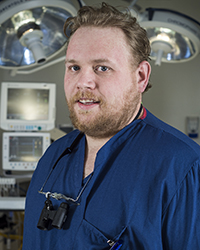On October 24, SEAMO is focusing on Brain Cancer Awareness Day and the work of Dr. DJ Cook, Division Head and Chair of Neurosurgery in the Department of Surgery. Dr. Cook is also an associate professor in the Centre for Neuroscience Studies. His research program is focused on understanding brain recovery following trauma, stroke and in the post-operative period using multimodal brain imaging and quantitative neurobehaviours.
Head and Chair of Neurosurgery in the Department of Surgery. Dr. Cook is also an associate professor in the Centre for Neuroscience Studies. His research program is focused on understanding brain recovery following trauma, stroke and in the post-operative period using multimodal brain imaging and quantitative neurobehaviours.
Dr. Cook’s clinical work sees him dealing with brain cancer patients regularly. “In clinical practice, I work with patients with brain tumours and their families to plan a course of care: initially, this starts with discussions around the diagnosis and the prognosis based on the clinical data. We then look at the patient’s goals and choose the path forward that best matches their wishes – often we perform a surgery where we plan the best approach to resect, debulk or biopsy the tumour,” he explains. “This is followed by radiation and chemotherapy in cases of malignant lesions or conservative monitoring in benign pathologies. And when a malignant diagnosis leads to neurological decline, we work with patients and their families to transition patients into palliation. In all cases, our goals are to help patients achieve the best possible outcome that aligns with their personal wishes and goals to maximize their quality of life.”
One thing Dr. Cook wants patients to know about brain tumours is they are not all equal. “Not every brain tumour is a death sentence. Tumours require a tissue diagnosis before drawing conclusions about prognosis; and more and more tumour genetics are becoming critical in designing personalized therapies and refining prognostication,” he says.
The advice Dr. Cook has for patients facing a brain tumour is to work with your physician and medical team to understand the diagnosis and the specifics of the pathology first. “Reach out to local support groups to meet others facing the same diagnosis and talk about what to expect,” he says.
Dr. Cook says the understanding of brain tumour biology, and, in turn, the ability to cure brain tumours is evolving at a rapid pace. He says, “I am optimistic we will have cuts to end therapies for malignant brain tumours within my lifetime. We should work together to support research and systems of care delivery that will help to move us closer to definitive cures for malignant brain tumours.”
